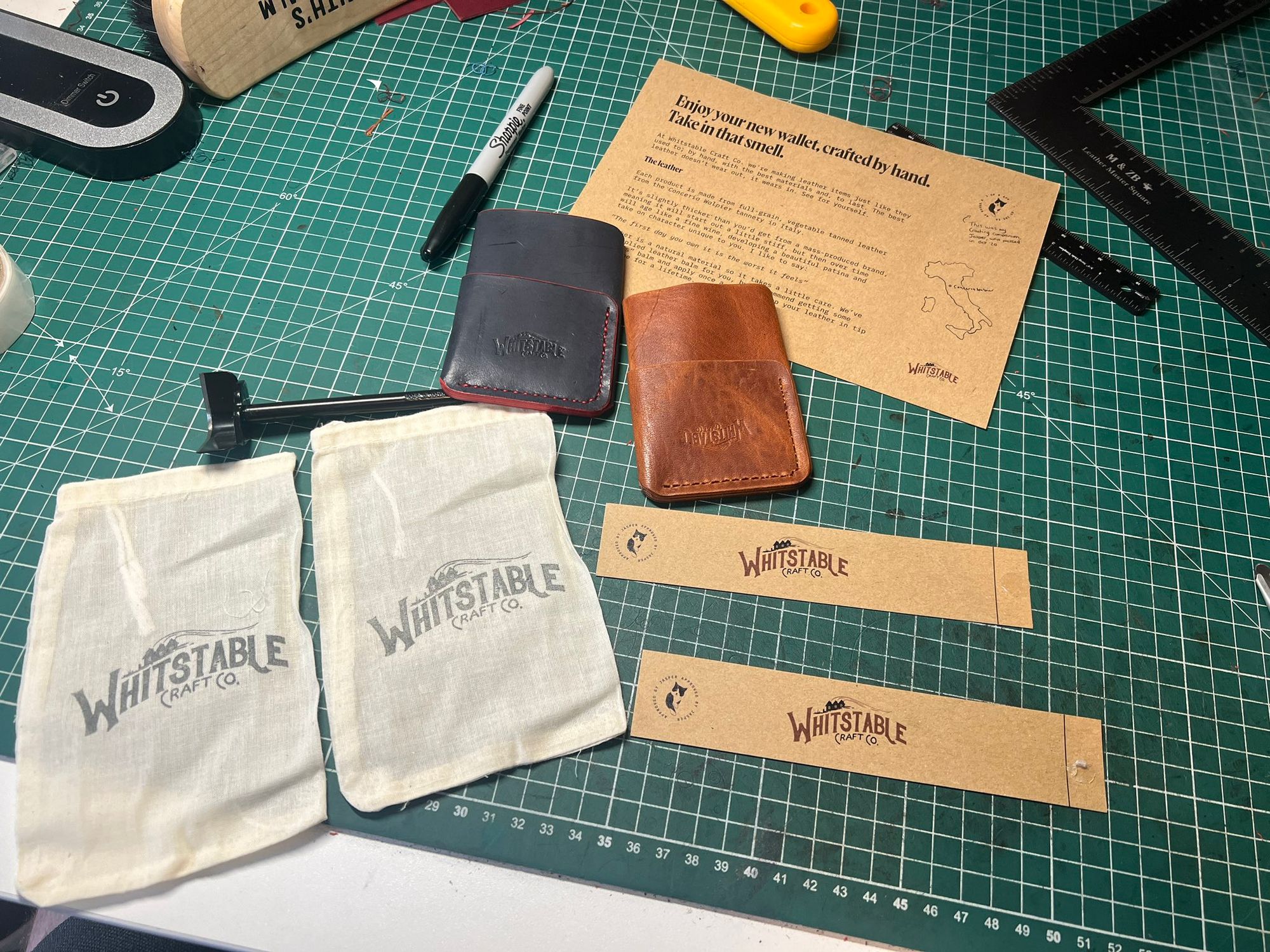James McKinven is an entrepreneur who has succeeded in making money from podcasts - no easy feat. He earns about $12k per month by editing podcasts for companies, hosting the Indie Bites podcast which has sponsorships and making his own leather wallets.
Can you introduce yourself?
Hi, I’m James from Canterbury in the UK (just an hour outside London on the train). I’ve been a full-time solo entrepreneur for the past 2 years with most of my income currently from producing podcasts for clients (around $10k per month). I also have two podcasts, Indie Bites and This Indie Life, which collectively do around 10,000 downloads per month adding a further $1.5k to my monthly revenue.
The final thing I spend my time on is my leather wallet business, Whitstable Craft Co, which usually makes around $500-$1,000 per month. So a few different revenue sources, no MRR in the traditional sense, but my total monthly is around $12k currently.

How did you get into making the Indie Bites podcast?
Indie Bites started in September 2020 as I got more involved in the indie hacking scene. I met a bunch of my lifelong friends at Indie Beers meetup in London and was inspired by their approach to life. I’d always wanted to go into entrepreneurship but couldn’t figure out how. I specifically remember chatting to Grey Baker from Dependabot (acq. by Github) and being astonished that he was making $10k a month from his SaaS.
I already had another podcast at this time called Marketing Mashup, but I found myself less interested in marketing people and more interested in indie hackers. Since I no longer had a commute I was struggling to find time to listen to podcast and was surprised there weren't many shorter shows. So I thought I’d make a 15 minute podcast speaking to Indie Hackers.
My first episode was with my friend Charlie Ward - who started Indie Beers and Ramen Club - to test the concept. I then reached out to some of my other friends from the Ramen Club community who had interesting stories, such as Harry Dry of Marketing Examples and Sabba Keynejad of VEED. I then started sending out DMs and emails to some of my favourite founders one of which was founder of Indie Hackers himself, Courtland Allen.
Courtland was exploring the idea of starting an Indie Hackers podcast network at the time, so he took me and a few others under his proverbial podcasting wing. This got the kickstart the show needed.
How did you start editing podcasts for people?
I’ve been making videos since I was young and so I had transferable skills over to podcasting. When I saw more shows popping up in 2019, I thought I’d give it a go myself. Bought some microphones and started my first show, Marketing Mashup. I was working at a marketing agency at the time so I was interviewing my colleagues and other folks in marketing.
My goal at this point was to freelance my way into entrepreneurship, so I explored ways of picking up video production gigs on the side of my job. When I started my podcast, I began to also offer podcast production services.
The Marketing Mashup podcast kicked off a nice flywheel, actually, because I was able to meet new people in marketing who would come on for an interview and I could pitch them my podcast editing services.
When COVID happened all of my video production work dried up so I decided to focus entirely on podcasting.
My main current client (Uncensored CMO) is a funny story. At this point I’d moved onto my next job as a marketing manager at a market research company. Part of the reason I got that job was because of my content production skills. While I was there, we had a new CMO join who was interested in starting a podcast. While still employed by that company, I produced the first 30 or so episodes of the show. When I decided to leave full-time employment, they hired me as a contractor to produce the podcast.
Do you think podcast editing it at risk from AI?
No it’s not at risk, I think it’s very helpful actually. I’ve benefited from AI tools such as Descript to speed up my production workflow. As tools get better it does lower the barrier to entry for new podcast editors to compete at cheaper rates, but in my mind that just opens up more opportunities to go up-market with my services. I hate the AI hype, but like the tools that genuinely make my life better.
How did you grow your podcast audience for Indie Bites?
I mentioned before about Courtland from Indie Hackers flirting with the idea of a podcast network. Well, part of that was helping promote shows in the network. I was lucky enough to not only have a link to my show on the Indie Hackers website, but also have one of my episodes (with Sabba) published on the Indie Hackers podcast feed. This took my average episode downloads from 30/40 to 300 overnight.
From there it was what I now see as quite a standard podcast promotion framework. I shared every episode I published on Twitter and encouraged the guests to share too. If you have guests on your show that have a good following and they share, you usually get a few extra listens. I experimented with blog posts for each show, but I didn’t find they made too much difference.
I’ve always had a lot of pride in the quality of the content which helps with word of mouth. Since the early days I feel fortunate that many people have shared episodes of the show because they’ve enjoyed listening.
Can you tell us about your wallet business?
My wallet business, Whitstable Craft Co, is my pride and joy. I’d love to be able to reduce my podcast production work and make wallets full time.
I’ve never been good with my hands and spent my entire working life staring at a screen for 8 hours a day (often more). I wanted to find something outside of screens that I could do as hobby. I found a DIY leathercraft kit online and was instantly hooked. From there I started making more and more wallets until they were good enough that I could sell them to friends and family. I was interested in learning about ecommerce, so spun up a Shopify website and got to work.
There is something immensely satisfying about creating something with your hands, using centuries old techniques with a beautiful material to make a product that will last a lifetime. Then, when you sell one and see it in someone else’s hands, something that they will carry round with them every day - you don’t get that feeling with SaaS.
Since I started selling them I’ve made $14,800, with about 250 of my wallets out in the open. I was going very slowly until November last year, when Lenny Rachitsky from Lenny’s newsletter bought a wallet, shared it on Twitter and sales went off the charts. I made $2,000 in a day and $7,000 in the run up to Christmas. It was wild. I got to live out 2 months of doing the wallets pretty much full time and it was a blast. This made me realise how much I’d love doing this as my main thing.
My biggest customer is actually a chap called James Browne, who was the person who recommended the wallet to Lenny in the first place. He’s bought 8 of my wallets for himself and as gifts for others.

What are your plans for growing your wallet business?
So after things went crazy last year, things expectedly started to tail off and I had lots of client work to catch up on. My main client has invested in turning his show from audio to video, so I’m having to spend a lot more time on that. All this to say I haven’t done as much sustained growth work for Whitstable Craft Co as I would have liked.
My plan is to build out a video content strategy across TikTok, Shorts and IG reels, as I have seen a few other successful leathercraft creators do. There is a recipe for success there, but it takes consistent effort and a lot of work. I suspect if I keep making excuses not to do it I will miss the organic growth opportunity there.
I also plan to experiment with ads on Instagram and TikTok, influencers and email marketing. Handmade leather wallets at my price point are not always an impulse purchase, so getting people into the marketing funnel I think will be essential.
Also expanding the product line is in my sights. Right now it’s quite minimal with the card holders, but I’d like to get into making belts, bags and larger wallets.
Are you a tiny bets guys rather than just doing one thing?
I’ve straddled this fence for a long time, but I can’t ignore the fact that the majority of people that have seen success have doubled down on something. I’ve even spoken to many people who were in the small bets camp, then switched their focus and found success.
Now there are of course outliers to this, there always will be, but I think if you really want to grow your thing, you’re not going to be able to do it with your fingers in too many pies.
I mean my scenario is quite an interesting example. My growth has been incredibly stunted because my focus is stretched across so many things. The cost of context switching is incredibly large and I struggle with it.
That being said, there is nothing wrong with taking the small bets approach if you’re not optimising for growth and you enjoy doing multiple things. You can even use your multiple projects to learn new things. But if you’re struggling for growth with your portfolio of projects and wondering why, that could be your answer.
One final thing on this - it’s a very privileged position to be able to “double down on one thing”. To do this you’ll probably need some savings. If not, you’ll be having multiple bets, just one of them happens to be a job and another is a side project. Get your side project to a good revenue number, then you can quit your job and go all in (but only if you want to).
Where can people find out more about you?
This has been good fun, Pete! Thanks for the good questions. I hang around mostly on Twitter (@jmckinven) but if you want a one-stop shop for all my projects, I’ve got them all listed on my personal website. And if you want to buy a wallet, you know who to call.

